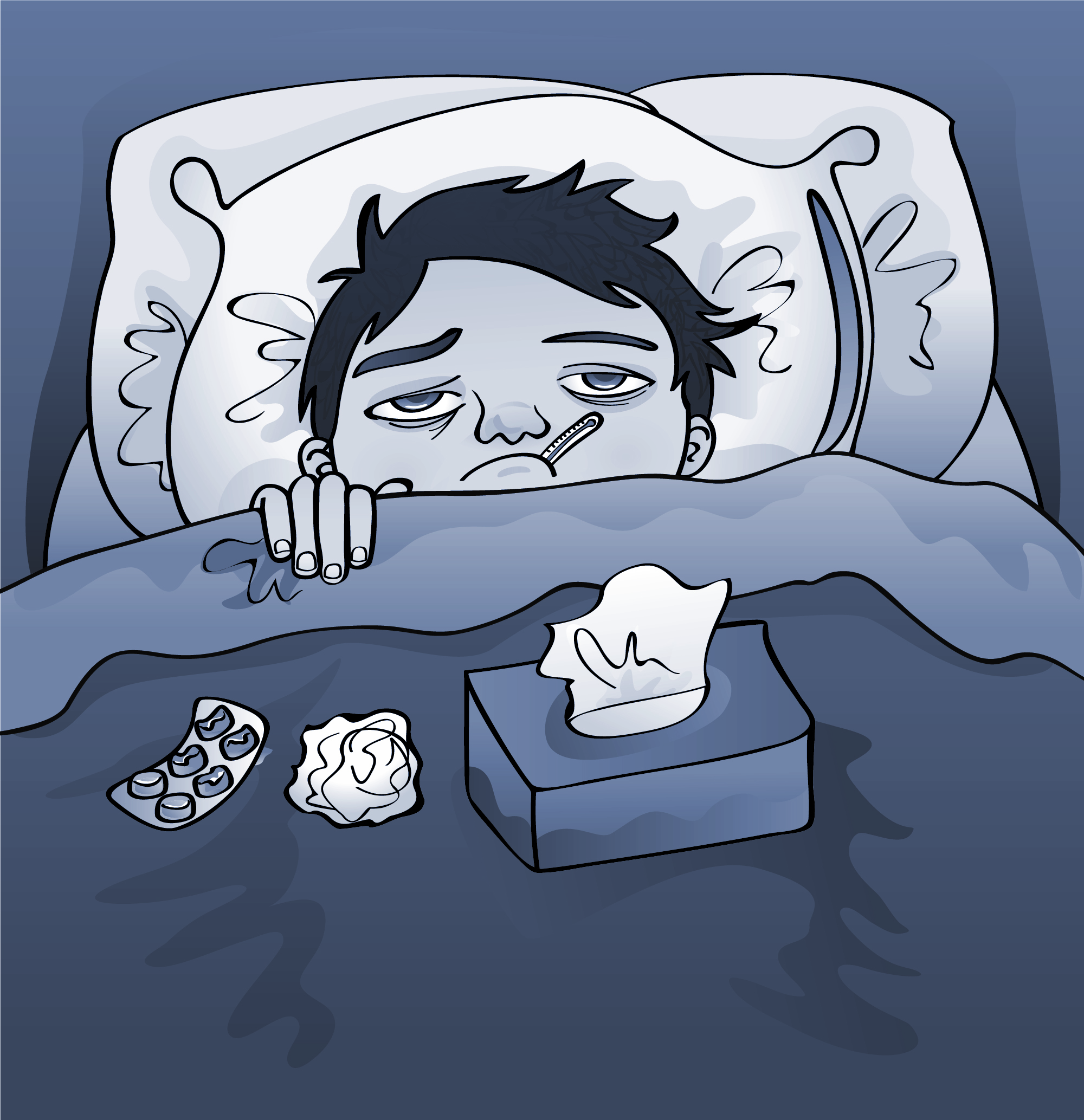The do's and don'ts of flu season
Here's how to minimize your chances of falling ill this fall


A free daily email with the biggest news stories of the day – and the best features from TheWeek.com
You are now subscribed
Your newsletter sign-up was successful
Ah, fall. Cooler temperatures and changing leaves. Shorter days and back-to-school. Fabulous fall fashions! Pumpkin Spice Lattes! What's not to love about this most delicious of seasons?
Getting sick.
There are a couple of reasons Labor Day seems to usher in an uptick in illness in most parts of this country. Children and adults returning from vacations into the close proximity of classrooms and offices unwittingly bring exotic viruses from afar into those confined spaces. And grandma was right: Colder temperatures do negatively impact the human immune system.
The Week
Escape your echo chamber. Get the facts behind the news, plus analysis from multiple perspectives.

Sign up for The Week's Free Newsletters
From our morning news briefing to a weekly Good News Newsletter, get the best of The Week delivered directly to your inbox.
From our morning news briefing to a weekly Good News Newsletter, get the best of The Week delivered directly to your inbox.
So what can you do to minimize your chances of falling ill this fall?
For answers, we turned to an expert: Mercedes R. Gallup, BSN, RN-BC, PHN, Board Certified in College Health. Mercedes is the Nursing and Clinical Support Unit Supervisor at the California State University at Northridge, which means she's spent many years working with thousands of students and faculty — trying to keep everyone well. Here are a few things she recommends you do — and don't do! — to stay healthy.
Do start well.
It sounds simple … and it is. People who enter the cold and flu season in good health are likelier to stay healthy, and those who do pick up a bug will recover more quickly and completely. Mercedes explains:
A free daily email with the biggest news stories of the day – and the best features from TheWeek.com
Fatigue, stress, a sedentary lifestyle, and poor diet all take a toll on the immune system. Stay well rested. Manage your stress through meditation and exercise, which will also help you keep physically fit enough to fight off any viruses you might encounter. Same goes for eating a healthy diet and drinking plenty of water.
Don't be so touchy.
"Often we infect ourselves with flu by touching contaminated surfaces and transferring those viral particles right to our eyes, nose, and mouth," Mercedes explains. "We unconsciously touch these areas hundreds of times a day. It's probably impossible to not do it at all, but consciously minimizing these little gestures can be helpful."
Do get a seasonal flu shot.
"The Center for Disease Control recommends everyone above the age of 6 months have a seasonal flu shot unless medically contraindicated," says Mercedes. "Flu vaccines are developed to anticipate what influenza strains might be most common during an upcoming season. This may sound hit-and-miss, but even so there is still value. The flu vaccine challenges your immune system, giving it a 'boost,' and there may be cross protection to other strains."
But what about those who refuse immunization because "I got the flu shot once, and it made me sick!"?
Despite this popular excuse, there is no correlation between injection and illness. Folks who become sick on the heels of receiving a flu vaccine simply have had the bad luck to either have been exposed before being protected or to have encountered one of the thousands of virus strains not included in that year's vaccine. Even in these cases, " … if you've had the vaccine, chances are good your immune system will have a better response, and the severity and duration of your flu may be reduced. Get the vaccine!" Mercedes counsels.
Don't be gross.
If you do come down with a bug, keep it to yourself.
"Coughing and sneezing launches virus-filled water droplets into the air, Mercedes says. "Those particles can go right to the mucus membranes — the eyes, nose, and mouth — of your nearest neighbor and expose them to your illness."
That doesn't sound very neighborly, does it?
"Use tissues liberally to cover your nose or mouth as you cough and sneeze, and wash or sanitize your hands in between bouts. In a pinch, use the inside crease of your elbow, not your bare hands, to keep from spraying everyone around you with your germs."
Do. Wash. Your. Hands.
Hands down: The number one way to prevent the spread of all kinds of disease is hand-washing. "Frequent, thorough hand-washing," Mercedes recommends. "Rub your hands together with plain soap — not antibacterial — and warm water during the time it takes you to sing Twinkle, Twinkle, Little Star. This alone could keep you illness free all season."
Don't be That Guy.
Mercedes bemoans the mentality of medical stoicism that suggests working through illness is a sign of virtue and strength.
"I know it's hard to miss work or school, and you might be inclined to just 'power through,' but really … do everyone a favor and stay home, especially if you have a fever. People who go out in public while ill are spreading disease."
And consider this: You might get through your bout of something unpleasant without any severe complications, but if you go out while ill, you could be putting other people — those who are immuno-comprimised, elderly, or very young babies — at great risk for serious illness. Don't do that.
"You should be fever free for 24 hours … without having taken any over-the-counter fever medicines … before you head back to work or school. Have tissues, wipes, and even some hand sanitizer to use to keep others around you protected," says our expert.
Do keep your distance.
Conversely, you will inevitably encounter that person who refuses to stay home and goes out and about while ill. Mercedes counsels you to stay away from that person.
"… Politely, of course," she laughs. "'Social distancing' describes space you should keep around yourself when in the presence of others who are ill. Three to six feet is a good rule of thumb; droplet-borne illness doesn't settles to surfaces fairly quickly."
Mercedes notes some hospitals and clinics in the country have gone so far as to adopt the "fist pump" greeting in lieu of handshakes during this season to avoid transmission of illness.
Don't go to the clinic … unless you have to.
It's a fact: Places that treat sick people are great places to get sick.
"I recommend that everyone have a little care kit ready just in case they do come down with something," Mercedes says.
Generally, influenza, flu-like illnesses, and colds can be managed without medical intervention, so have what you need on hand. Over-the-counter medicines will help make you more comfortable. Treat your symptoms as you have them, and take the medicines consistently and according to direction. Have a thermometer at home; this monitoring device will let you know if and when you might need to see a medical professional. High fevers — greater than 101 and lasting more than a couple of days — may need medical attention, especially if you have other health issues or a compromised immune system."
Do keep it clean.
"Keeping common surfaces disinfected can really make a difference during flu season," says Mercedes. "Keyboards, phones, doorknobs, TV remotes — any surface shared by multiple people can serve as a vector for disease."
You don't have to be obsessive about sterilizing everything you touch. But do invest in disinfecting wipes to keep at home and at the office, and wipe down shared surfaces as much as practical.
… And just in case?
Mercedes has some advice: "If you do get ill, rest. It is in fact the best medicine. And, yes, hot tea lemon and honey will make you feel better."
Leslie Turnbull is a Harvard-educated anthropologist with over 20 years' experience as a development officer and consultant. She cares for three children, two dogs, and one husband. When not sticking her nose into other peoples' business, she enjoys surfing, cooking, and writing (often bad) poetry.
-
 How the FCC’s ‘equal time’ rule works
How the FCC’s ‘equal time’ rule worksIn the Spotlight The law is at the heart of the Colbert-CBS conflict
-
 What is the endgame in the DHS shutdown?
What is the endgame in the DHS shutdown?Today’s Big Question Democrats want to rein in ICE’s immigration crackdown
-
 ‘Poor time management isn’t just an inconvenience’
‘Poor time management isn’t just an inconvenience’Instant Opinion Opinion, comment and editorials of the day
